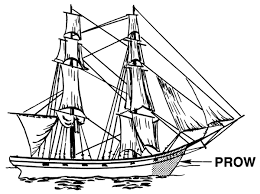prow 船首来自古法语proue,船首,来自拉丁语prora,船首,来自pro,向前,在前,来自PIE*per,向前,词源同forth.
- prow
- prow: [16] ‘Being in front’ is the etymological notion that underlies prow. It comes ultimately from Greek próira ‘front of a ship’, which was probably a derivative of Indo-European *pro ‘before, in front’. It reached English via Latin prōra and Old French proue.
- prow (n.)
- "forepart of a ship," 1550s, from Middle French proue, from Italian (Genoese) prua, from Vulgar Latin *proda, by dissimilation from Latin prora "prow," from Greek proira, related to pro "before, forward," proi "early in the morning," from PIE *pre-, from root *per- (1) "forward, through" (see per).
Middle English and early Modern English (and Scott) had prore in same sense, from Latin. Modern Italian has proda only in sense "shore, bank." Prow and poop meant "the whole ship," hence 16c.-17c. figurative use of the expression for "the whole" (of anything).
- 1. The prow of the motor - boat cut through the water like a knife.
- 汽艇的船头像一把刀子劈开水面向前行驶.
来自辞典例句
- 2. The part of a ship at which the prow joins the keel.
- '前'.''踵艏''. '柱'.''脚船的一部分,船首与船骨相接于此.
来自互联网
- 3. And there were wishes here, but never prow and stern.
- 既载人,也载梦想, 但范围出不了船头船尾.
来自互联网
- 4. The prow of the motor cut through the water like a knife.
- “汽艇”的船头像一把刀子劈开水面向前行驶.
来自互联网
- 5. But never more than fit between prow and stern.
- 但范围离不开船头与船尾之间.
来自互联网
[ prow 造句 ]
